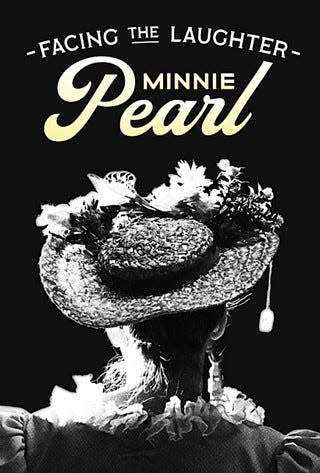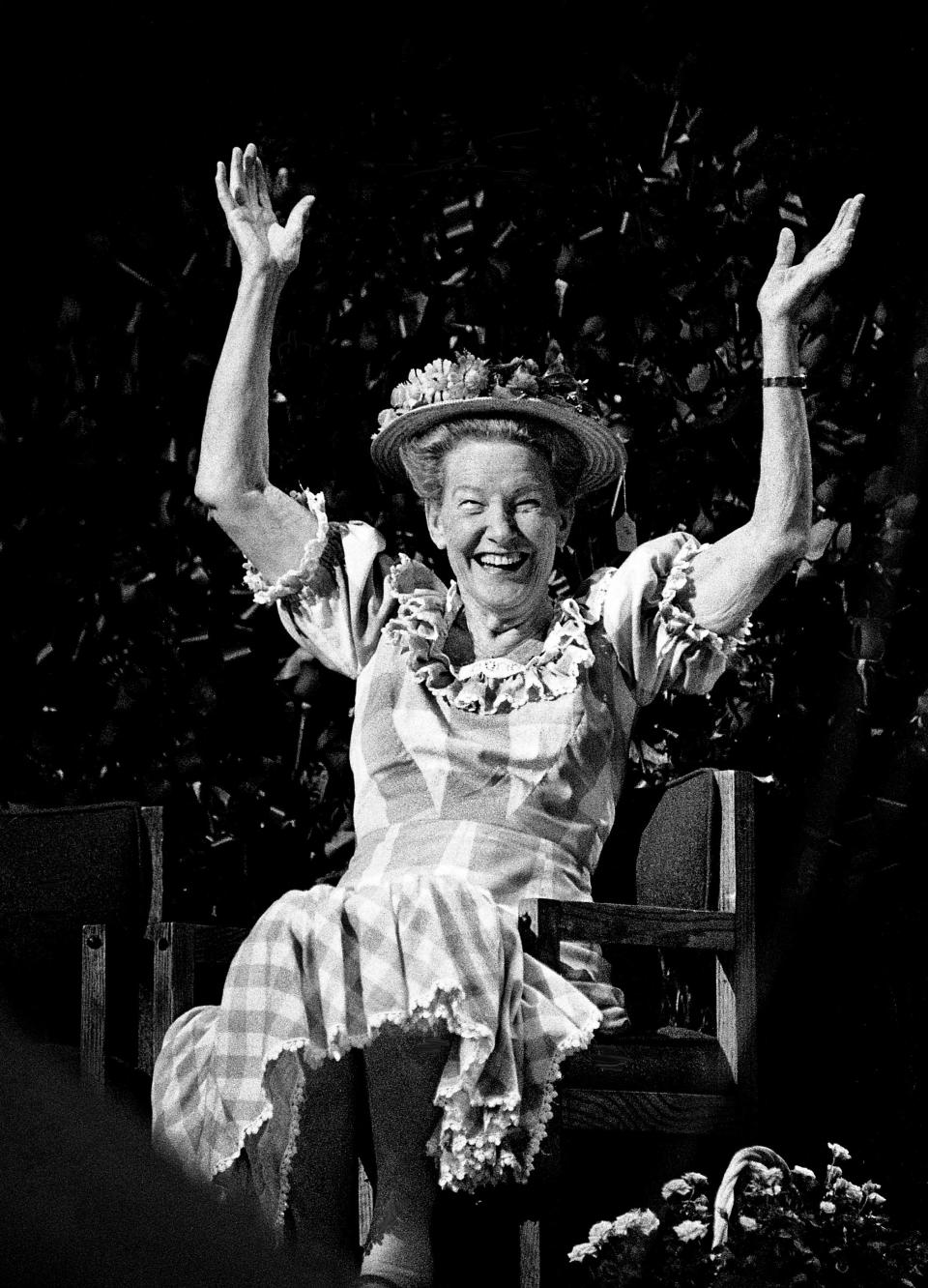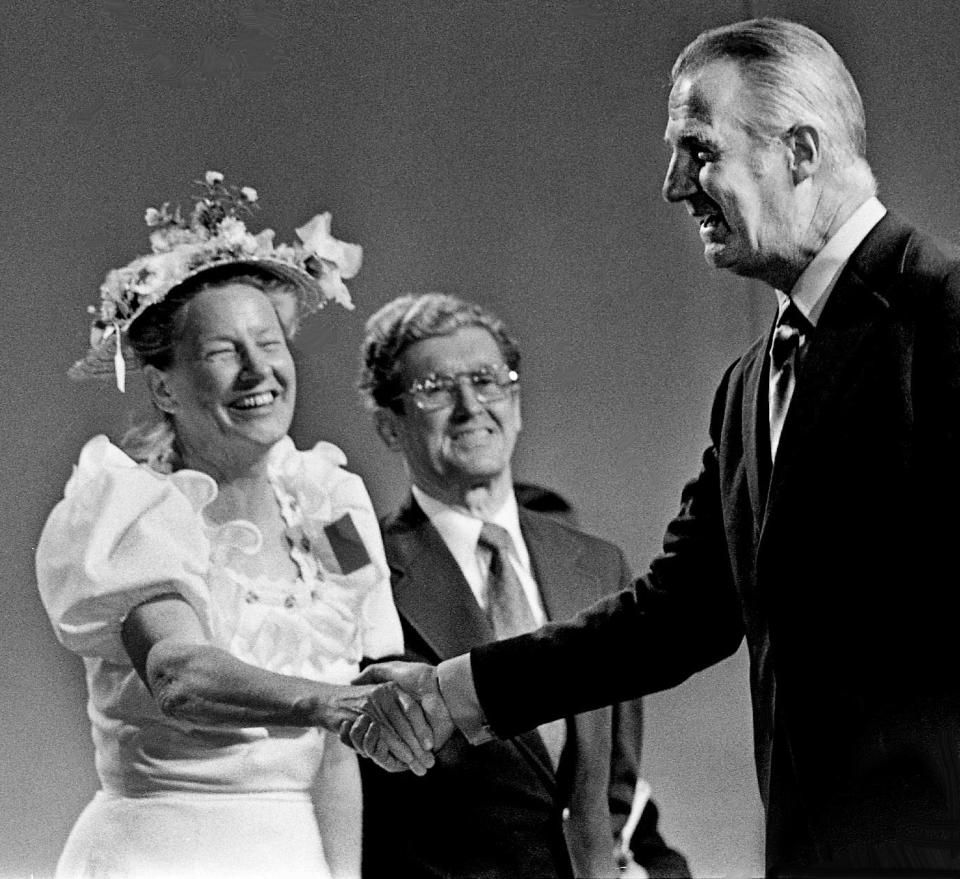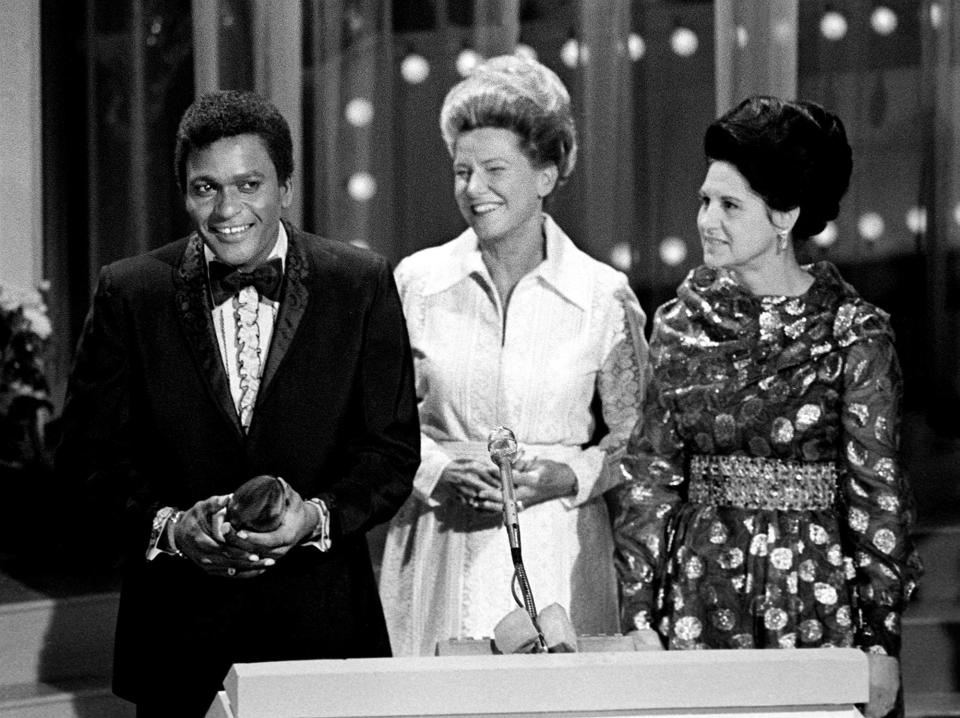'Facing The Laughter' doc celebrates Minnie Pearl's comedy-to-country crossover legacy
When Minnie Pearl passed away on Mar. 4, 1996, fellow Grand Ole Opry member Marty Stuart stated the moment felt like "someone kicked the cornerstone" out of what Garth Brooks called the "foundation" of country music.
Director Barbara J. Hall's 90-minute Fathom Events and Nashville Public Television documentary "Facing the Laughter: Minnie Pearl" will be released to screens and streaming portals nationwide on Feb. 6, 2023. It does well to chronicle the biographical elements of the groundbreaking comedienne and only non-musical, comedy-related Country Music Hall of Fame inductee (in 1975) — born Sarah Ophelia Colley Cannon on Oct. 25, 1912, in Centerville, Tenn.
Also, it digs a layer beneath her wicker hat worth $1.98, plus a trademark greeting of "How-dee!"

Most significantly, it contextualizes the depth and scope of the reach of Pearl's career as a sardonic-witted storyteller who dressed her intelligence down, to tell the truth in a tongue-in-cheek way.
Ultimately, Pearl's humor allowed for archetypes, caricatures and stereotypes of the rules of Southern society to maintain separation between country music as a show and country music as a business, allowing the industry to use its fundamental tie to rural-style Americana to remain culturally viable and grow financially during the critical middle portion of the genre's century-long history.
Thoughts listed in the prior paragraph are attributed to a diverse who's who of the genre that Pearl influenced and inspired during her five-decade-long career who appear in the documentary. Dozens of artists — from Brooks and Dwight Yoakam to Amy Grant and Tanya Tucker, plus groundbreaking queer country performers k.d. lang and Chely Wright — celebrate Pearl's legacy as one forged by compassion, empowerment and humor.

Footage in the documentary is snatched from many sources where Pearl appeared across multiple mediums in her career. However, notable is a local Nashville news snippet that highlights Demonbreun Street on the day of Pearl's 1996 funeral — the shot of the now-closed Country Star Cafe, Wild West Indian Shop and the Hank Williams Jr. Museum note a long-gone era before the industry of country music overtook Music Row in a series of modern offices replacing a colorful myriad of kitschy, quaint storefronts.
Pearl's humor — and its global, beloved reach — retained the stereotypically rural notions highlighting Nashville's entrepreneurial storefront past. Though the buildings were torn down and Pearl passed away, her legacy preceded — and on many levels created — the space in which Music Row and country music could become corporate and mega-lucrative.

Moreover, the genteel sensibilities that have eased the genre's ability to cast a net broader than ever before while entrenching itself deeper into those lucrative corporate desires — while also appealing to fans separated by gender, politics and race at a time when those notions are more divisive than ever — before all bear pieces of Pearl's humanity.
"(Minnie's humor) reached from Nashville to Chicago, New York, Los Angeles, nationwide," Hall, the documentary's director, told The Tennessean.
"Sarah Cannon's ability to use her bright, sharp intellect to portray Minnie Pearl as a sophisticated version of the 'slow-talking country bumpkin'' of sorts navigated and superseded all of the challenges that American culture faced to remain unified. Because that humor was based in the culture associated with country music, it made the genre an authentic piece of American life."
Middle Tennessee State University History professor Dr. Kristine M. McCusker — a historian long affiliated with preserving Pearl's legacy — appears in the documentary and makes mention of the importance of Pearl's ability to blend her roots in minstrelsy, vaudeville and Confederate southern mythology alongside her education as a theater and dance major at well-heeled women's finishing school Ward-Belmont College (Belmont University's precursor).
This point allows for points made by k.d. lang about Pearl's unique empathy enabling her to represent "an emotional safety net who understood the trajectory of where and who country music needed to embrace," Yoakam praising her ability to use her "profoundly theatricality" to create an "indelible place in the annals of American cultural history." Meanwhile, American University professor Caty Borum cited her work as necessary for granting "access for underrepresented people who don't have access to structural power to be able to tell their own stories," fully developing the fulcrum of a unique inflection point that defined Pearl's impressive legacy.
This legacy impacted Americans living in the country during her peak, as between being a member of the Grand Ole Opry from 1940 onward, plus entertaining soldiers and rural residents, touring nationwide, playing one-nighter gigs for three decades, and making frequent appearances on radio and television. She was a ubiquitous part of the lives of somewhere in the neighborhood of 200 million people over a half-century.
Notable too is how Pearl — though an inclusive icon ("When Minnie stood beside you, ain't nobody gonna say you don't belong there," stated Brooks in the documentary) also earned (adjusted for inflation) somewhere in the range of $100,000 per appearance as a campaign stumper for noted Alabama conservative governor and presidential candidate George Wallace, whose political strategies often leaned on using Southerners' racial grievances to gain their support.
If you are wondering how generations of southern women tied to country music from Dolly Parton ("I am not being political. I don't do politics. I'm not getting into any of that," she told People Magazine in 2018) to Miranda Lambert (able to seamlessly both record the song "Y'all Means All," for Netflix's "Queer Eye" as a noted ally for her gay brother, but also appear onstage as a special guest at a Jason Aldean concert in 2022), look no further than to Minnie Pearl's background for evidence of how — and why — this occurs.
"(Minnie) was the last to judge and the first to embrace," stated Wright.

Dayton Duncan, a collaborator with Ken Burns on PBS' 2019-released "Country Music" series, adds the following quote that sums up the connective power of Pearl's forthcoming documentary with awareness of its unprecedented scope.
"'Facing the Laughter' finally gives the incomparable Minnie Pearl the full attention she deserves. It tells her remarkable life story through a treasure trove of archival television footage, interviews with family members and historians, country music stars who knew her and were encouraged by her, comedians who she influenced –– and a tape-recorded reminiscence in which she candidly described the challenges she faced and the choices she made to carve out her extraordinary career.
"She was a path-breaking comedian on the national stage and most of all, a brilliant, sophisticated performer (Sarah Cannon) whose alter ego (Minnie Pearl) entertained millions of people. The film provides new depth, context and insights into her life and art."
This article originally appeared on Nashville Tennessean: Documentary celebrates how Minnie Pearl balanced comedy and country
